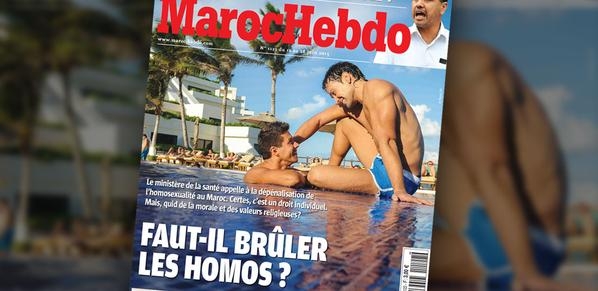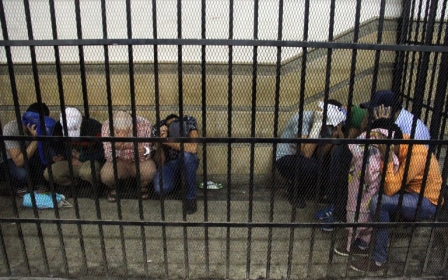Morocco kiss trial resumes as debate on gay law rages

The trial of two men arrested for kissing in public resumed on Tuesday in Morocco, where a string of recent controversies has reignited debate over homosexuality in the kingdom.
Being gay is punishable in Morocco by up to three years in jail and the divisive law -- known as Article 489 -- has been the subject of several protests, including by feminist protest group Femen.
The furore boiled over last week when a weekly magazine was forced to withdraw from sale its latest edition, which featured a front cover headline asking: "Should we burn gays?"
The trial of the two men, which began on Friday, prompted an advocacy group to launch an international petition calling for their release. By Tuesday afternoon it had been signed by 70,000 people.
Last month, a member of British rock band Placebo used a performance in Rabat at Morocco's Mawazine festival to protest against the country's criminalisation of homosexuals.
Bassist Stefan Olsdal took to the stage playing a rainbow-coloured guitar with "489" written on his chest in reference to the anti-gay law.
The gesture caused a storm on social media, with the guitarist writing on his Instagram account that "article 489 condemns homosexuality in Morocco. Still!! Let's get rid of it!"
Hours earlier, two Femen members, both French nationals, were expelled from Morocco after protesting topless in front of Rabat's Hassan Tower.
Morocco's General Directorate of National Security said the pair had "performed an obscene sequence" and were "topless, sporting a slogan that offended public morality".
'In gay we trust'
Images shared on social media showed them embracing each other with their tops off in front of the landmark minaret in the capital.
"In gay we trust" was written in black on the torso of one of them.
A day later, 1,500 people protested in front of the French embassy in Rabat against Femen, but it was the two men who drew the most headlines after they appeared to kiss each other on the same site where the French women had bared their breasts.
The names of the men and their photographs quickly appeared in local media, and the trial has attracted criticism from rights groups.
Human Rights Watch called on the kingdom in March to drop the law that leaves gay people facing prison.
The cover of last week's Maroc Hebdo showed two young men at a swimming pool, smiling and gazing into each other's eyes, with the banner headline: "Should We Burn Gays?"
Maroc Hebdo said it "decided to withdraw from sale and its website" the edition, "given the particularly strong reactions" it caused.
The issue said "homosexuality is, of course, an individual right", but added that debate on the topic had to take into account "moral and religious values".
The cover, first circulated on social media, drew instant criticism, with some commentators chiding it as "homophobic", but with its creators saying it was designed to provoke debate.
Another French-language weekly, Tel Quel, published an editorial appearing to support the decriminalisation of homosexuality.
"Homosexuals are not deviant nor sick," it wrote. "Consensual love between two adults is not a crime."
Middle East Eye propose une couverture et une analyse indépendantes et incomparables du Moyen-Orient, de l’Afrique du Nord et d’autres régions du monde. Pour en savoir plus sur la reprise de ce contenu et les frais qui s’appliquent, veuillez remplir ce formulaire [en anglais]. Pour en savoir plus sur MEE, cliquez ici [en anglais].




